Roofing Companies Whitburn
Find top Roofing Companies in Whitburn
Get multiple Roofing Services quotes for your project today! Compare profiles, reviews, accreditations, portfolio, etc... and choose the best deal.

Thompsons Roofing & Driveways
4.210 reviews19 Warren Avenue, Wakefield, WF2 7JW, GBFirst Class Roofing & Driveway Services In West Yorkshire Get In Touch For A Quote & Fast Assistance With Any Requirement With decades of experience taking care of roofs, buildings and driveways, we are committed to providing a competitive, professional service. We pride ourselves on our high level of skill and excellent customer service, and we always aim to deliver a first class experience. You can rest assured that your project will be completed to the highest standard possible. We undertake all roofing and general building work including Interior and Exterior Painting, Decorating, Rendering, Roughcasting, Patios, Driveways, all types of Brickwork, Landscaping, Fencing, and Decking, Flat Roofing, Conservatory Roofing, and uPVC Roofline. Our specialist paving teams have been laying down high quality driveway installations for
- Services
- Why Us?
- Our Team
- Testimonials
- Gallery
Get Quote
Approved Roofers Ltd
32 reviewsSunderland, GBApproved Roofers is a leading directory for Roofers Nationwide. We do insurance checks on every roofer that joins us. You can leave reviews and read what others have said. Work with one of our Approved Roofers today.
- Services
- Why Us?
- Testimonials
- Gallery
Get Quote
H J Henderson Roofing
3.33 reviewsNE, GBNorthumberland Roofing Network is a network of roofing professionals serving Northumberland. They offer a wide range of services, including roof repairs, flat roofing, pitched roofing, fascias and soffits, and more. They emphasize the importance of a well-built roof and provide expert advice and solutions for all your roofing needs.
- Services
- Why Us?
- Gallery
Get Quote
Builders & Roofing Contractors
GBThe Federation of Master Builders (FMB) is the UK's largest trade association for small and medium-sized (SME) construction businesses. We support our members by providing a range of services to help them promote, protect and grow their businesses. Our members are vetted and inspected to meet high standards, so you can build with confidence. We are committed to raising standards in the construction industry and providing a voice for SME builders. We campaign on issues that affect our members and the wider construction sector, and we work to ensure that the industry is sustainable and delivers high-quality homes. The FMB badge of quality is a mark of excellence that demonstrates to clients that you are a professional builder they can trust. By joining the FMB, you can access a range of benefits, including: Access to a network of over 8,000 SME builders Support services to help you promote, protect and grow your business Access to exclusive discounts and deals Training and development opportunities Legal and technical advice Join the FMB today and discover the benefits of membership.
- Services
- Why Us?
- Gallery
Get Quote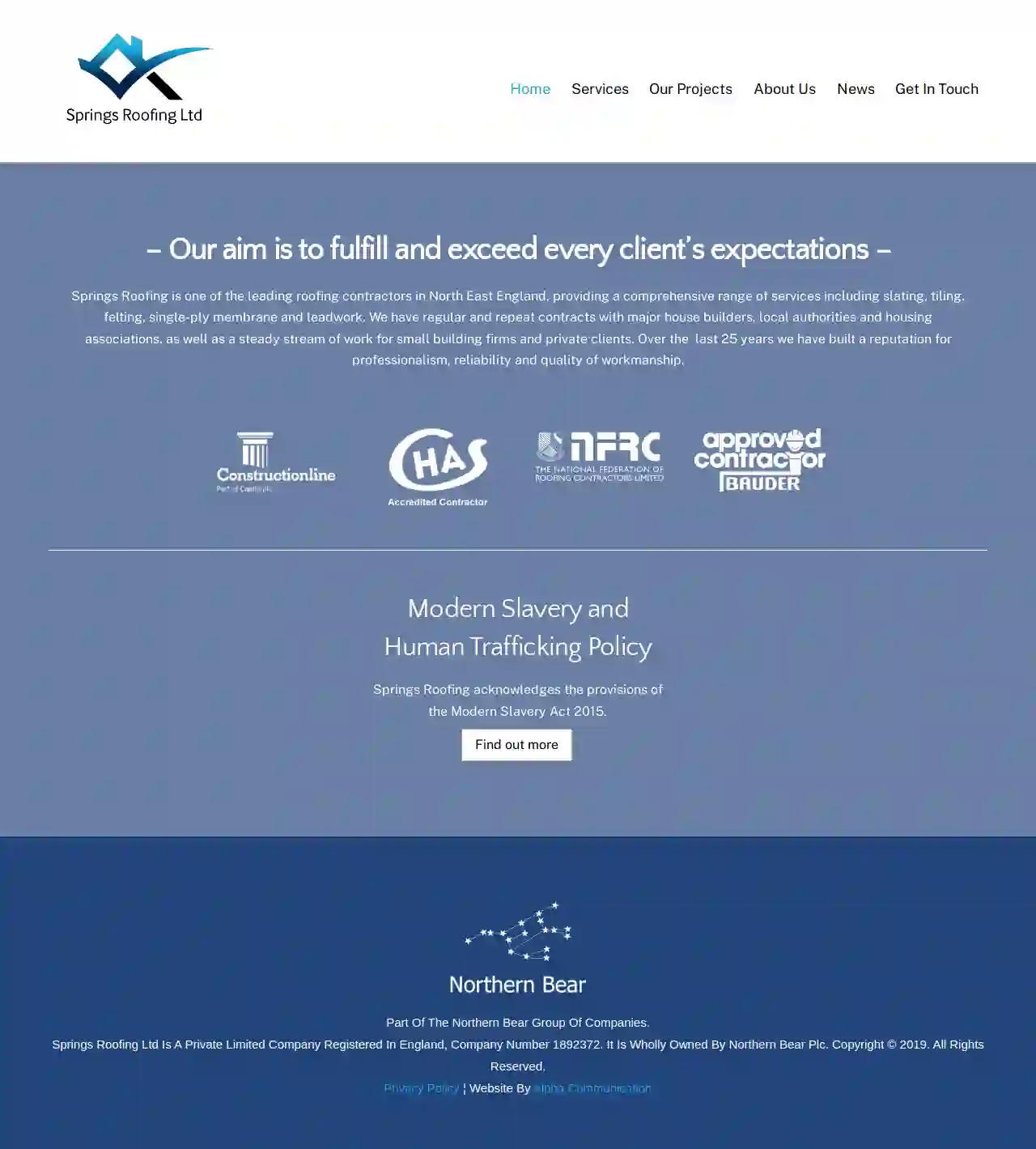
Springs Roofing Ltd
3.312 reviewsGBSprings Roofing is a leading roofing contractor in North East England, renowned for its comprehensive range of services. For over 25 years, they've built a reputation for professionalism, reliability, and exceptional workmanship. Their expertise spans slating, tiling, felting, single-ply membrane, and leadwork, catering to a diverse clientele including major house builders, local authorities, housing associations, and private clients. Springs Roofing is committed to exceeding client expectations, delivering dependable, responsive, and cost-effective solutions. As part of the Northern Bear group, they leverage a strong team of over 60 roofing operatives, including time-served slaters and tilers, all equipped with CSCS cards and many holding NVQ level 2 or 3 in Slating and Tiling. Their ongoing training program ensures continuous skill development and upholds their commitment to quality.
- Services
- Why Us?
- Our Team
- Gallery
Get Quote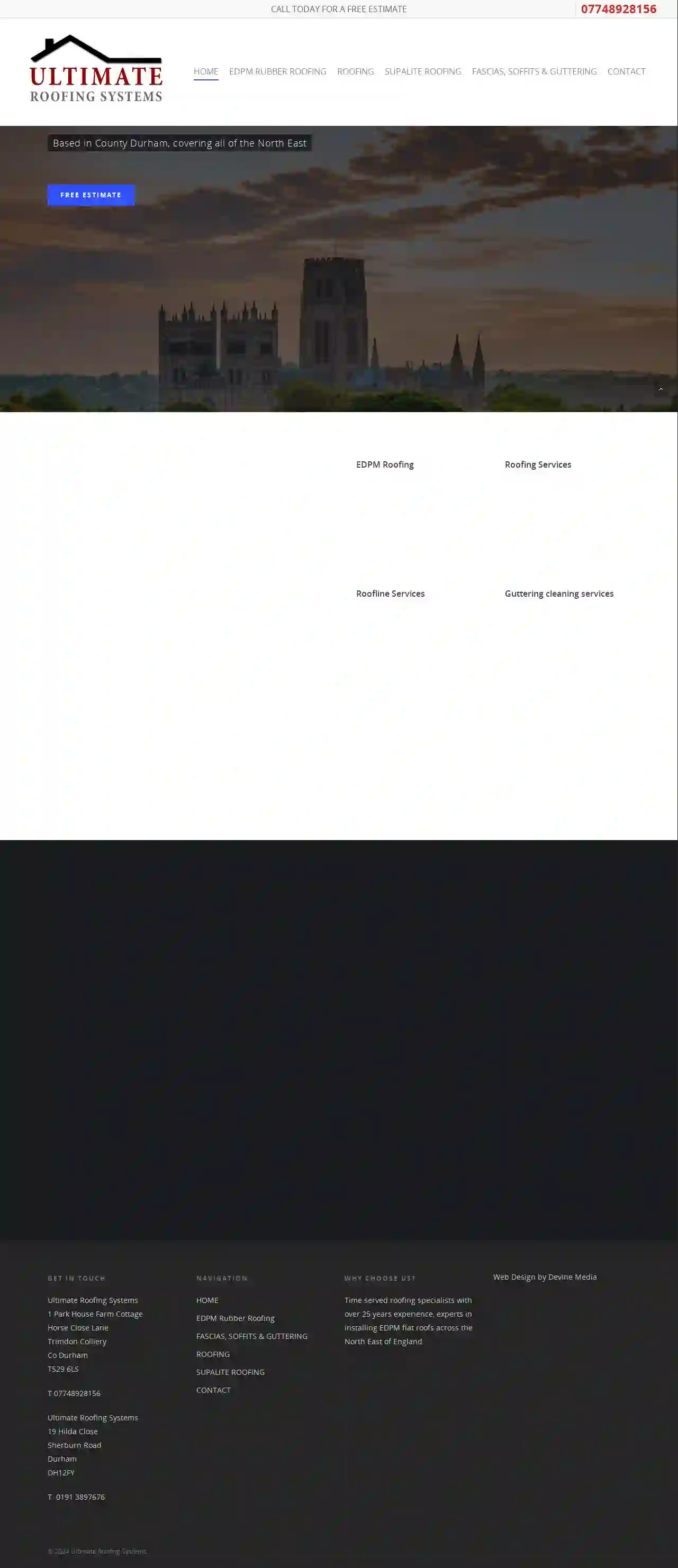
Ultimate Roofing Systems
4.912 reviewsSherburn Road, 19 Hilda Close, Durham, DH12FY, GBTime served roofers based in County Durham, covering all of the North East. FREE ESTIMATE. Specialists in all aspects of roofing, Ultimate Roofing Systems are based in Trimdon Colliery, Co Durham and are qualified in EDPM rubber roofing installations. What is EDPM roofing? EDPM roofing is an extremely durable rubber roofing membrane that is most commonly used on flat roofs, it is made of of two materials firstly ethylene and secondly propylene which are extracted from oil and natural gas. EDPM comes in two colours black and white and can come in different sizes and thickness depending on the your flat roofing project. The membrane is fully sealed with the use of high quality liquid adhesives giving you that reassurance of a fully sealed and weather proof flat roof. EDPM Flat Roofing Experts Rubber Roofing Durham | Roofers Peterlee | Guttering Services | 25 years in the Building Trade EDPM Roofing Extremely Durable Water tight Ideal for flat roofs For all weather types For large flat roofs Roofline Services Fascias Soffits Guttering Barge boards Upvc products Roofing Services Full roof installations Roof repairs Concrete tile roofs Slate roofs Firestone roofing Guttering cleaning services Improves the appearance of your property Extends the life of your guttering Avoids the build up of damp Rain water needs to flow away from your property Minimum intrusion Covering the North East of England Specialists in EDPM flat roofing Learn More
- Services
- Why Us?
- Gallery
Get Quote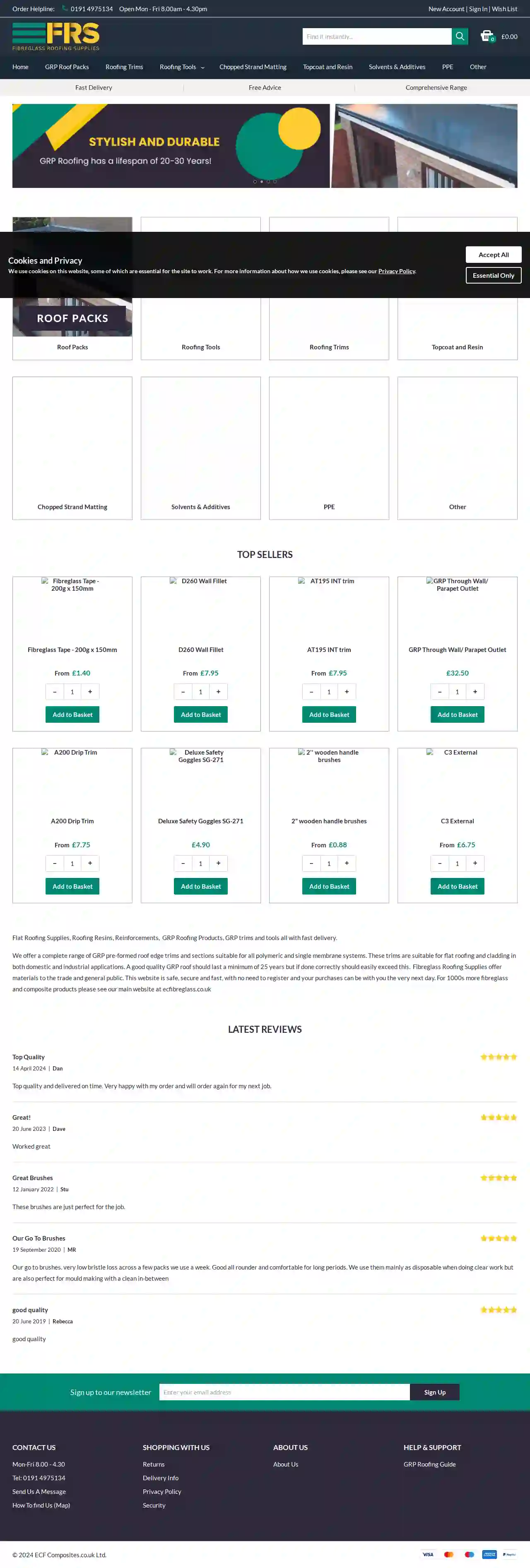
FRS Fibreglass Roofing Supplies
Unit 1, The Business Centre, South Shields, Head Office, NE33 4JF, GBOur company began life in 1966 as a producer of high quality fibreglass parts, clients included the US Navy & Concorde. In 2010 we started selling a few materials on eBay, followed shortly thereafter by a dedicated ecommerce website. The website took off so quickly that 2 years later we moved out of rented premises into a custom warehouse which we built behind our production factory. A couple of years later we bought the land next door and built a second warehouse. We are a family owned company employing approx 30 people at our head office in South Shields. Although we are a fast growing company we are passionate about customer service which is reflected in our Google Customer Reviews score of 4.9/5.0 making us the highest rated company in our field.
- Services
- Why Us?
- Testimonials
- Gallery
Get Quote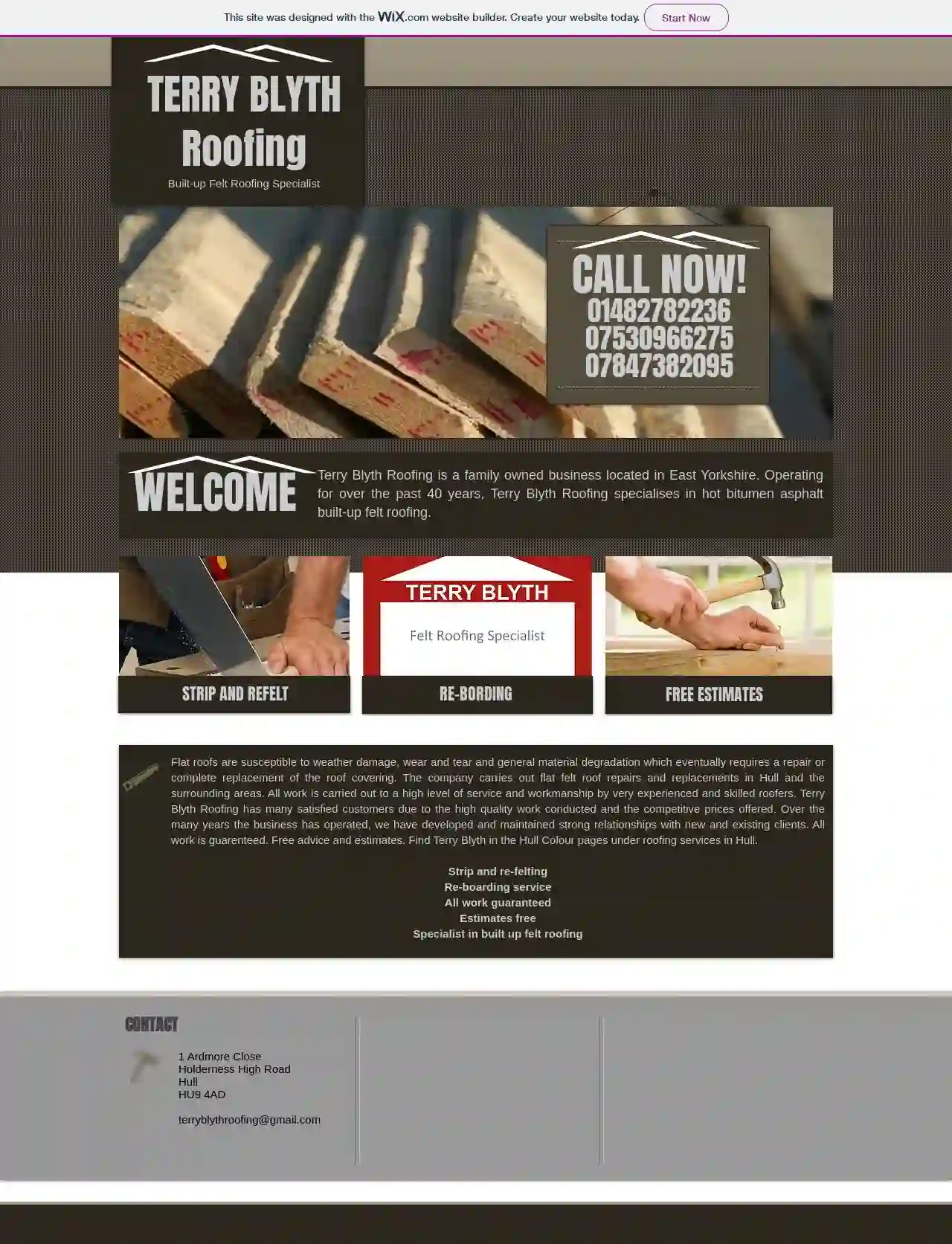
Terry Blyth Roofing
Holderness High Road, 1 Ardmore Close, Hull, HU9 4AD, GBTerry Blyth Roofing is a family owned business located in East Yorkshire. Operating for over the past 40 years, Terry Blyth Roofing specialises in hot bitumen asphalt built-up felt roofing. Flat roofs are susceptible to weather damage, wear and tear and general material degradation which eventually requires a repair or complete replacement of the roof covering. The company carries out flat felt roof repairs and replacements in Hull and the surrounding areas. All work is carried out to a high level of service and workmanship by very experienced and skilled roofers. Terry Blyth Roofing has many satisfied customers due to the high quality work conducted and the competitive prices offered. Over the many years the business has operated, we have developed and maintained strong relationships with new and existing clients. All work is guaranteed. Free advice and estimates. Find Terry Blyth in the Hull Colour pages under roofing services in Hull.
- Services
- Why Us?
- Gallery
Get Quote
NEC ROOFING & REPAIRS
553 reviews19 Hillfield Avenue, London, NW9 6NY, GBNec Roofing contractors, London. With a skilled team of honest & conscientious workers based in London, our work locations are the London Borough of Barnet, Colindale, Edgware, North Finchley, Finchley, New Barnet, & London Borough of Brent, Wembley, Kingsbury, Neasden, Willesden, Harlesden, Cricklewood, Park Royal & London Borough of Harrow Harrow, Pinner, Stanmore & London Borough of Ealing, Acton, Ealing, Greenford, Hanwell, Northolt, Perivale and Southall, Hertfordshire, Watford, Borehamwood, Hemel Hampstead, Hatfield, St. Albans, Welwyn Garden City, Potters Bar. We’re one of the few roofing companies still trading under our original name, because on the very rare occasion a customer has encountered any kind of problem with a job, we always strive to rectify the issue and ensure customer expectations aren’t just met, but exceeded. Almost 10 years of experience has taught us a thing or two about health & safety, and we have the certification to prove it. We don't take guarantees for granted, we pride ourselves on our proven track record and exceptional quality. We cover all aspects of roofing: tiling, slating, flat roofing, lightweight roof coverings, chimney repairs & re-pointing and installation of loft windows. We can also provide the facility for rebuilds or conversion of flat roofs to pitched roofs. Roofs are often sadly neglected, which can be a false economy as the roof protects the whole of a home. What starts off as a small repair can escalate into far more serious structural damage if left unattended. When a homeowner eventually needs to sell their house, a neglected roof will result in the purchaser’s surveyor recommending major works or a new roof, probably at an inflated price. Better to have the peace of mind that your roof is protecting your home & will not be an obstruction to a future sale. Common misconceptions are that roof work is best carried out in the summer months – however we work all year round & successfully carry out roof renewals without the roofs being left exposed to the elements. Our work is carried out in a tidy manner with as little disruption to your everyday life as possible. Ultimately, we can assist with any roof related work, whether it be a completely new roof, or you just need somebody to clean those leaves out of your gutter, we can help. We've specialised in residential roofing work for almost 10 years.Even the smallest details play a role in a roof's effectiveness and integrity. Hiring a roofing contractor is an act of trust. We're local, just like you and we understand what good work looks like.
- Services
- Why Us?
- Gallery
Get Quote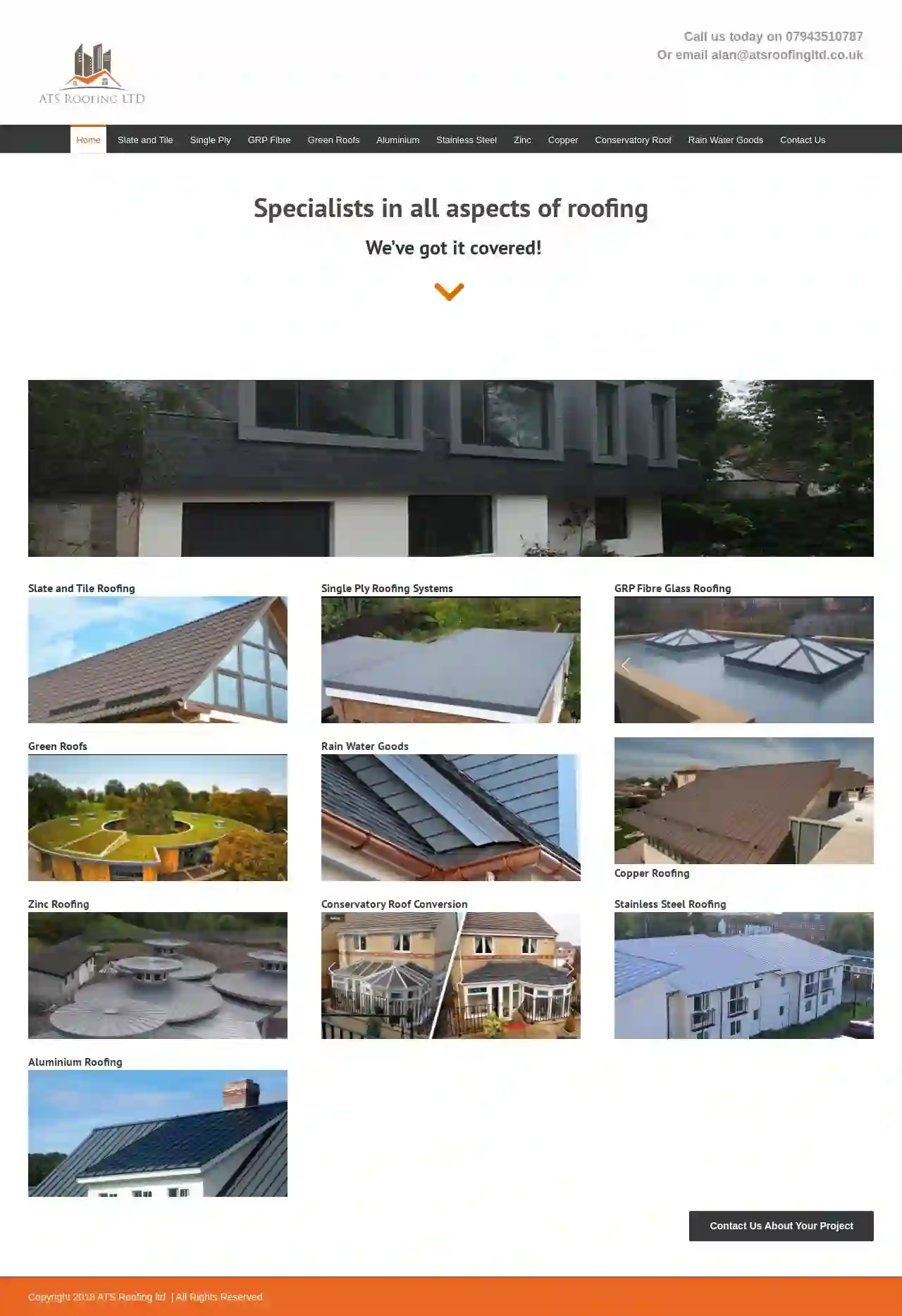
ATS Roofing LTD
51 reviewsNewcastle, GBSpecialists in all aspects of roofing. We’ve got it covered! ATS Roofing Ltd. is a company that has been established since 2018. We are dedicated to providing high-quality roofing services to our customers. Our team of experts has extensive experience in all aspects of roofing, including Slate and Tile Roofing, Single Ply Roofing Systems, GRP Fibre Glass Roofing, Green Roofs, Rain Water Goods, Copper Roofing, Zinc Roofing, Conservatory Roof Conversion, and Stainless Steel Roofing. We are committed to delivering exceptional results and providing excellent customer service. Contact us today to learn more about our services and how we can help you with your roofing needs.
- Services
- Why Us?
- Gallery
Get Quote
Over 12,314+ Roofing Contractors onboarded
Our roofing experts operate in Whitburn and beyond!
Roofyng.co.uk has curated and vetted Top Roofers arround Whitburn. Find the most reliable contractor today.
Frequently Asked Questions About Roofing Companies
- Asphalt Shingles: Popular, affordable, available in various styles (3-tab, architectural, etc.)
- Metal Roofing: Durable, long-lasting, energy-efficient, available in panels, shingles, or tiles.
- Tile Roofing: Clay, concrete, or slate; known for longevity, durability, and aesthetic appeal.
- Flat Roofing: EPDM rubber, TPO, PVC, modified bitumen, or built-up roofing (BUR).
- Slate: Natural stone, extremely durable, expensive, requires expert installation.
- Wood Shakes or Shingles: Natural wood, aesthetically pleasing, requires regular maintenance.
- Hot Climates: Opt for light-colored or reflective roofing materials to reduce heat absorption. Consider tile roofs for their thermal mass and heat resistance.
- Cold Climates: Ensure your roof has adequate insulation and ventilation to prevent ice dams and moisture buildup. Metal roofs can shed snow effectively.
- High-Wind Areas: Choose roofing systems with high wind ratings and properly installed hurricane straps or clips to enhance wind resistance.
- Areas with Heavy Rainfall: Ensure your roof has proper drainage and a waterproof membrane to prevent leaks.
- Clear the Area: Remove any vehicles, outdoor furniture, or other items from around your house to provide the roofing crew with easy access.
- Protect Landscaping: Cover plants, shrubs, and other landscaping elements near the house with tarps or plastic sheeting to protect them from falling debris.
- Clear the Attic: Remove or cover items stored in your attic, as dust and debris might fall through during the removal of the old roof.
- Notify Neighbors: It's courteous to inform your neighbors about the upcoming roof replacement project, especially if it's likely to be noisy or disruptive.
- Discuss Logistics with the Contractor: Coordinate with the roofing contractor regarding access to your property, parking arrangements, and any special instructions or concerns you have.
- Roof size and complexity
- Roofing material chosen
- Local labor costs
- Accessibility of the roof
- Removal of existing roofing
- Additional features (skylights, chimneys, etc.)
What are the different types of roofing materials?
How do I choose the right type of roof for my climate?
How do I prepare for a roof replacement?
How much does a new roof cost in the UK?
What are the different types of roofing materials?
- Asphalt Shingles: Popular, affordable, available in various styles (3-tab, architectural, etc.)
- Metal Roofing: Durable, long-lasting, energy-efficient, available in panels, shingles, or tiles.
- Tile Roofing: Clay, concrete, or slate; known for longevity, durability, and aesthetic appeal.
- Flat Roofing: EPDM rubber, TPO, PVC, modified bitumen, or built-up roofing (BUR).
- Slate: Natural stone, extremely durable, expensive, requires expert installation.
- Wood Shakes or Shingles: Natural wood, aesthetically pleasing, requires regular maintenance.
How do I choose the right type of roof for my climate?
- Hot Climates: Opt for light-colored or reflective roofing materials to reduce heat absorption. Consider tile roofs for their thermal mass and heat resistance.
- Cold Climates: Ensure your roof has adequate insulation and ventilation to prevent ice dams and moisture buildup. Metal roofs can shed snow effectively.
- High-Wind Areas: Choose roofing systems with high wind ratings and properly installed hurricane straps or clips to enhance wind resistance.
- Areas with Heavy Rainfall: Ensure your roof has proper drainage and a waterproof membrane to prevent leaks.
How do I prepare for a roof replacement?
- Clear the Area: Remove any vehicles, outdoor furniture, or other items from around your house to provide the roofing crew with easy access.
- Protect Landscaping: Cover plants, shrubs, and other landscaping elements near the house with tarps or plastic sheeting to protect them from falling debris.
- Clear the Attic: Remove or cover items stored in your attic, as dust and debris might fall through during the removal of the old roof.
- Notify Neighbors: It's courteous to inform your neighbors about the upcoming roof replacement project, especially if it's likely to be noisy or disruptive.
- Discuss Logistics with the Contractor: Coordinate with the roofing contractor regarding access to your property, parking arrangements, and any special instructions or concerns you have.
How much does a new roof cost in the UK?
- Roof size and complexity
- Roofing material chosen
- Local labor costs
- Accessibility of the roof
- Removal of existing roofing
- Additional features (skylights, chimneys, etc.)